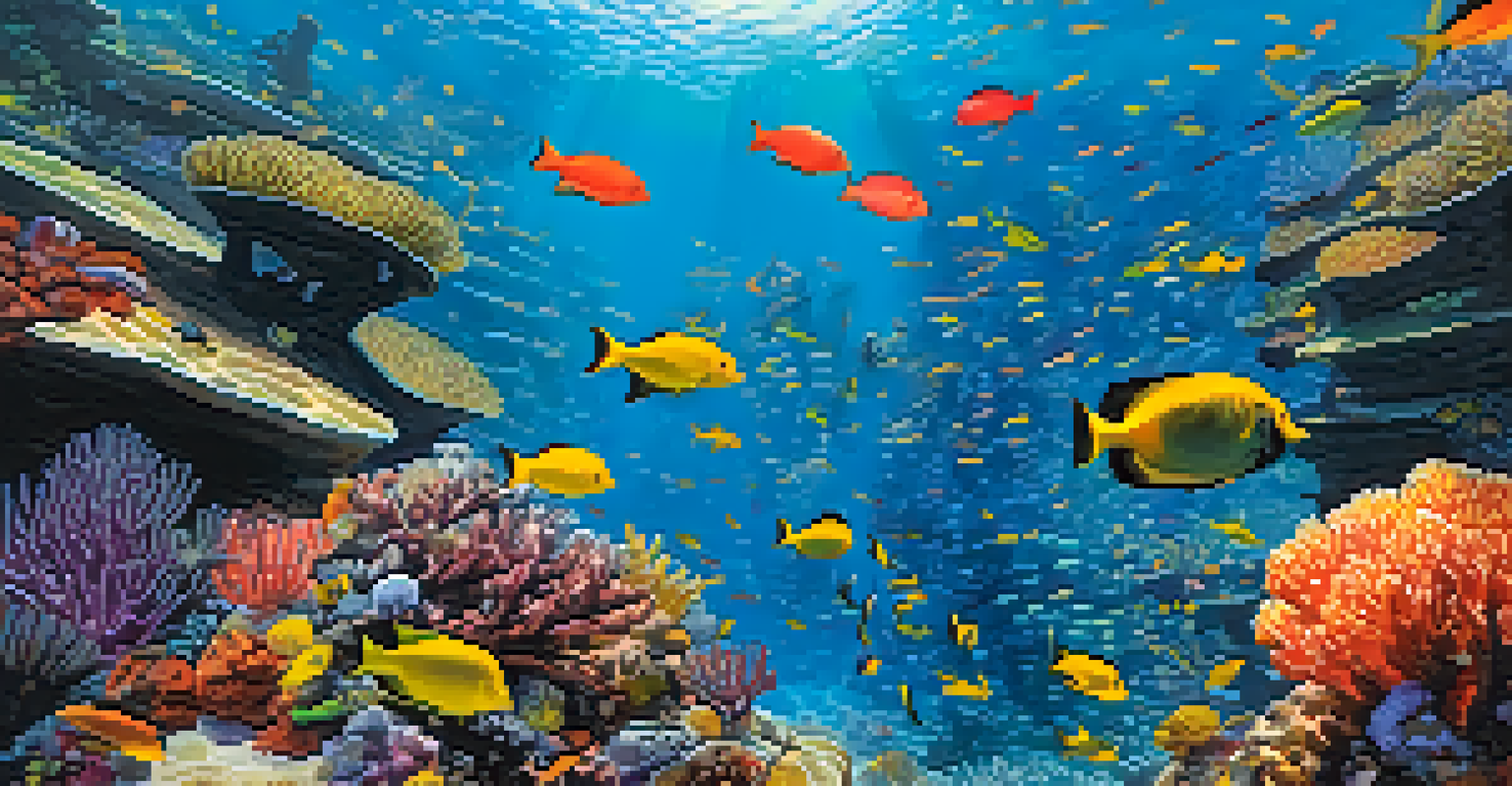The Role of UC San Diego in Marine Science Research

Introduction to UC San Diego's Marine Science Legacy
UC San Diego has long been at the forefront of marine science research, with its coastal location providing a unique natural laboratory for oceanic studies. Since its establishment, the university has cultivated a strong emphasis on understanding marine ecosystems, climate change, and ocean health. This commitment has not only advanced scientific knowledge but also contributed to the sustainable management of marine resources.
The ocean is a central piece of our planet’s life support system. Its health is critical for our survival.
The Scripps Institution of Oceanography, a part of UC San Diego, is one of the oldest and most prestigious centers for ocean research in the world. It has played a crucial role in various groundbreaking discoveries, ranging from ocean currents to marine biodiversity. Through collaboration with international organizations and local agencies, UC San Diego has become synonymous with excellence in marine science.
As a hub for innovation, UC San Diego attracts some of the brightest minds in marine research. Students, faculty, and researchers engage in interdisciplinary projects that address pressing global challenges, such as climate change and ocean acidification. This vibrant academic environment fosters new ideas and solutions that benefit both science and society.
Key Research Areas in Marine Science at UC San Diego
UC San Diego focuses on several critical areas in marine science, including biological oceanography, marine geology, and climate science. These fields are essential for understanding the ocean's role in global climate systems and the health of marine ecosystems. Researchers in these areas utilize cutting-edge technologies and methodologies to explore complex oceanic processes.

One notable area of research is the study of marine biodiversity, which examines the variety of life forms in the ocean and their interactions within ecosystems. This research is vital for conservation efforts, particularly in light of human activities that threaten marine habitats. By understanding these ecosystems, scientists can better advocate for policies that protect marine life.
UC San Diego's Marine Research Impact
The university plays a crucial role in marine science research, advancing knowledge and sustainable practices.
Another key focus is the impact of climate change on oceanic conditions. Researchers at UC San Diego investigate how rising temperatures and changing chemistry affect marine organisms and ecosystems. Their findings contribute to broader climate models and inform strategies for mitigating the effects of climate change on the ocean.
Innovative Technologies Used in Marine Research
UC San Diego is renowned for its pioneering use of technology in marine science research. From autonomous underwater vehicles to satellite remote sensing, the university employs a range of advanced tools to gather data and analyze oceanic phenomena. These technologies allow researchers to explore areas previously unreachable, expanding the horizons of marine science.
In every drop of water, there is a story of life. The ocean is our greatest teacher.
One example is the use of robotic submarines, which can navigate deep-sea environments and collect valuable data on temperature, pressure, and biological activity. This information is crucial for understanding the dynamics of deep ocean ecosystems. Such innovations not only enhance research capabilities but also inspire the next generation of marine scientists.
Furthermore, UC San Diego collaborates with tech companies to develop new instruments and software that improve data collection and analysis. These partnerships foster an environment of innovation that drives marine science forward, making significant contributions to our understanding of the ocean.
Collaborative Efforts with Local and Global Partners
Collaboration is a cornerstone of UC San Diego's marine science initiatives. The university works closely with various local, national, and international organizations to address complex ocean-related challenges. These partnerships enhance research efforts and ensure that findings are effectively translated into actionable policies.
For instance, UC San Diego collaborates with governmental agencies like NOAA (National Oceanic and Atmospheric Administration) to monitor ocean health and develop conservation strategies. Such collaborations leverage the strengths of different organizations, allowing for a more comprehensive approach to marine science.
Innovative Technologies Enhance Research
Cutting-edge tools like autonomous vehicles and satellite sensing expand the scope of marine science exploration.
Additionally, UC San Diego engages in global research networks that focus on pressing issues such as plastic pollution and overfishing. By sharing knowledge and resources, the university contributes to a collective understanding of these challenges and works toward sustainable solutions.
Educational Programs and Training Future Marine Scientists
UC San Diego offers a variety of educational programs aimed at training the next generation of marine scientists. Undergraduate and graduate programs in marine biology, oceanography, and environmental science equip students with the knowledge and skills needed to excel in this field. These programs emphasize hands-on learning, providing students with real-world research experiences.
Through internships and fieldwork opportunities, students gain practical experience that enhances their understanding of marine science. These experiences allow them to apply theoretical knowledge in real-world settings, preparing them for future careers in research, conservation, and policy-making.
Moreover, UC San Diego fosters a culture of mentorship, pairing students with experienced researchers. This guidance not only enriches the educational experience but also helps students build professional networks that are invaluable in their careers.
Impact of UC San Diego's Research on Policy and Conservation
The research conducted at UC San Diego has a profound impact on environmental policy and conservation efforts. Findings from studies often inform legislative decisions and contribute to the development of regulations aimed at protecting marine ecosystems. This bridge between science and policy is vital for ensuring that research translates into meaningful action.
For instance, studies on the effects of climate change on marine habitats have led to increased awareness and action around marine protected areas. Policymakers rely on the data generated by UC San Diego researchers to create frameworks that support sustainable practices and conservation efforts.
Collaborative Efforts for Ocean Health
Partnerships with local and global organizations strengthen research initiatives and inform conservation policies.
Additionally, the university’s outreach programs educate the public about marine issues, fostering a culture of conservation. By raising awareness and providing resources, UC San Diego empowers individuals and communities to participate in protecting our oceans.
Conclusion: UC San Diego's Ongoing Commitment to Marine Science
In conclusion, UC San Diego's contributions to marine science research are vast and impactful. Through innovative research, collaboration, and education, the university plays a vital role in understanding and preserving our oceans. As the challenges facing marine ecosystems continue to evolve, UC San Diego remains committed to advancing scientific knowledge and fostering sustainable practices.
The legacy of marine science at UC San Diego is not just about academic achievement; it’s about making a real difference in the world. Each research project, educational initiative, and collaboration contributes to a greater understanding of our planet's oceans and the urgent need for their protection.

Looking ahead, UC San Diego will undoubtedly continue to be a leader in marine science, inspiring new generations of scientists and environmental stewards. The future of our oceans depends on such commitment, and UC San Diego is poised to meet the challenge.